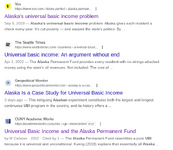The issue is whether a 40% tax bite will wreck the economy. The European experience suggests it won’t. I get you think taxes woukd have to doubled because of your biases but there is no logical reason that is required.
The US currently takes in 24% of GDP as taxes. That equates to about $5T of revenue. $15K per person of UBI also equates to about $5T of cost.
If you change the tax rate to accomplish 34% of GDP - the weighted average of OECD countries, that's put revenue at $7.1T, an increase of $2.1T.
29% of current revenue is spent on Social Security and on Economic Security Programs - Let's say we can completely eliminate those if we have UBI. That 29% equates to $1.45T. That means that $3.55T is spent on things that can't reasonably be eliminated.
So at 34% GDP tax rate, you've got $7.1T of revenue, $5T of UBI costs, and $3.55T of other costs, for a shortfall of 1.45T.
What rate do we need to actually cover the $8.55T of spend? By my math, that works out to a tax rate of about 41% of GDP.
Is it technically doable? Sure. You can do it. Is it reasonable and sustainable? That's a different question. That would make us the 8th highest taxes OECD country.
How are you going to make that happen? Are you going to put that all on the highest tax bracket? There's simply not enough of them, even if you increased that bracket to 90%. And that bracket is everyone with incomes of $690K and above. That's well, well below the level of the multi-billionaires that keep being addressed.
What's your plan for how to accomplish this? How much are you going to increase corporate taxes, and how are you going to keep them from skirting those taxes given the enormous loopholes that exist? How much is going to be plugged into personal income tax, which makes up the lion's share of revenue? How much impact will it have inflation - because it's going to definitely reduce the after-tax income that people have available to spend.
And all of that is assuming that employer's don't follow bilby's advice and drop everyone's wages to offset the UBI. And it's assuming no change in the labor market, everyone continues to work and nobody decides to stay home instead.


